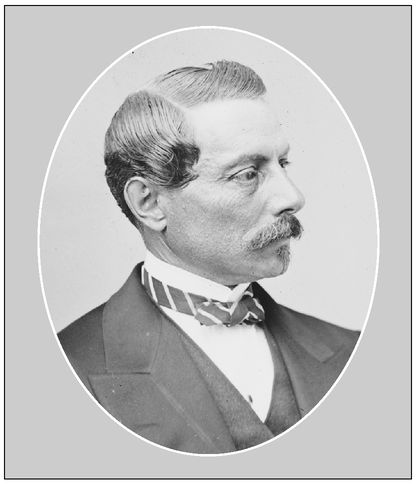9
APRIL 7—FORREST
Prophet Vindicated
Three hours after his second rousting of General Hardee, Forrest saw his early-morning prophecy begin to materialize.
On the Confederate right, his pickets—mostly clad in blue overcoats they had scavenged from the overrun Union camps—captured about fifty Federals in the rainy predawn. The captives confirmed what Forrest and his scouts had known since midnight: Buell’s men had been coming ashore at Pittsburg Landing all night.
Around 5:30 a.m. Forrest himself was with the pickets as Bull Nelson’s Federals counterattacked. Fighting, the cavalrymen withdrew toward the former Federal camps in what was now the Confederate army’s right-center.
1Behind Forrest’s retreating force, Confederate commanders dealt with disarray. Overnight they had made the same error that other Confederate commanders had made against Grant at Fort Donelson. They assumed they had won. So they pulled back and postponed an attempt to reorganize their intermixed commands until daylight. It was a tall job. They had sustained some 8,000 casualties. At least another 10,000 men were unaccounted for, many still looting the Union camps and sleeping off the liquor they had found there. More, having lost their units in the Shiloh thickets, had celebrated their army’s presumed victory by starting back to Corinth.
GENERAL P. G. T. BEAUREGARD
Beauregard could field only 20,000 men, at best, on April 7. The sole reinforcement he had received overnight was the Forty-seventh Tennessee Infantry, six hundred new recruits who had marched all night from their Tennessee training camp and did not arrive until 8 a.m. So at dawn Beauregard and his generals found themselves as surprised and hard-pressed as their foes had been twenty-four hours earlier. The supposedly whipped Federals were attacking.
Command control was makeshift. Brigadier generals Patrick R. Cleburne and Alexander P. Stewart were just two of the prominent subordinate commanders who had gotten separated from the bulk of their units and were leading remnants of their own men and a patchwork of others. A mistake in orders, or in understanding them, had sent General Cheatham and his comparatively organized division retreating four miles from Pittsburg Landing. Cheatham’s men were camped on the site of their preattack bivouac.
2This morning, Forrest’s men held their slowly retiring line intact against Bull Nelson’s advance for an hour and a half. At 7 a.m. infantrymen of Chalmers’s brigade, with elements of several other units, rushed in to relieve the cavalry. Forrest then got orders to form a straggler line to stop unauthorized retreating. At 11 a.m. more orders shifted his men farther left, where he dismounted some of his companies to fight as infantry. This tactic, still uncommon in America, Forrest had already used at Fort Donelson and in the ravine fronting Pittsburg Landing the previous day.
3Union pressure persisted all morning and well into afternoon. Because of the disorganization of his command, Beauregard had to scramble to cobble together a defense. Until around 10:30 a.m., he later claimed, he could field only some 10,000 infantry and artillery under Breckinridge and Hardee on his right and center against Buell’s fresh troops. On the left Bragg had to face Grant’s 20,000 or so with only about 7,500. By 11:30 Beauregard had to pull some of Bragg’s men away to plug the hole in his line left by Cheatham’s complete withdrawal from the battlefield overnight.
4The vastly outnumbered Confederates contended for the plundered Union camps as fiercely and tenaciously as the Federals had defended them the day before. It was useless, though. The South had missed whatever chance it might have had at Shiloh, and at mid-afternoon Beauregard acknowledged the fact. Around 3 p.m. he ordered a retreat. Forrest’s cavalry helped cover the rear.
5A hastily gathered Southern army that was rushed into combat half ready had fought and nearly beaten a force heavily leavened with veterans from the Federal victory at Fort Donelson. But one of the Confederates’ most highly regarded generals, Braxton Bragg, who during the battle had decimated some of his own brigades by insisting on assaulting strong positions with outflanked or badly outnumbered units, characteristically seemed not to notice his own mistakes. Instead, always ready to look down his nose at volunteers, he threw the whole blame on the democratic system that the American—and perhaps especially Dixie’s—elite viewed with contempt and fear. He would write a few days later that some of his troops and the civilian officers elected to command their companies and regiments had run out of ammunition during the battle but had been “too lazy to hunt the enemy’s camps” for “millions of cartridges” that lay all around them there.
“Our failure is
entirely due to a want of discipline and a want of [trained] officers,” he decreed. “Universal suffrage, furloughs and whisky have ruined us.”
6
